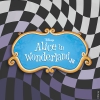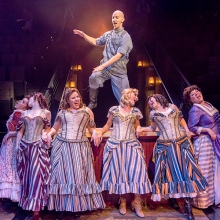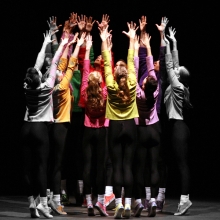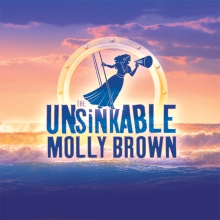Filichia Features: A New and Improved Women on the Verge
Filichia Features: A New and Improved Women on the Verge
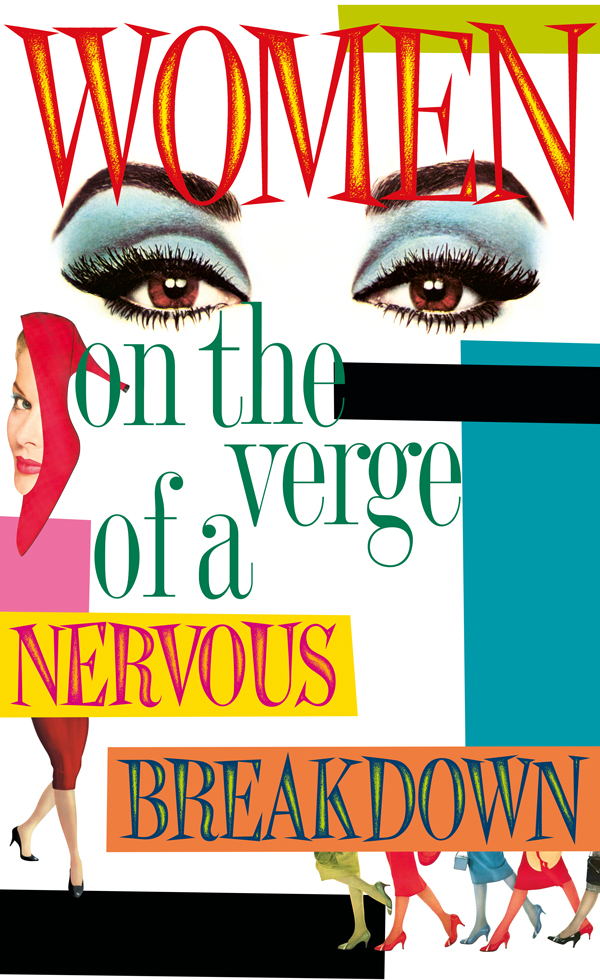
At a recent dinner with like-minded Broadway enthusiasts, one told of a director whose vision hadn't worked for what could have otherwise been a really good musical. Soon after, another spoke of a different director who had taken a musical that many had deemed worthless and had turned it into a success.
And that's when I brought up one director who did both - and with the same show.
Back in 2010 when I saw a preview of Bartlett Sher's production of Women on the Verge of a Nervous Breakdown, I didn't know where to look. Some of this was because of a confusing set design. Too many flats and pieces - and not very attractive ones at that - were rolling or flying in and out. The story got lost.
It was easy for that to happen, for Women, based on Pedro Almodóvar's 1988 Spanish-language film, does have a few intricate plots going on. Pepa and Ivan, two voice-over artists, have been having a torrid affair. His breaking it off made her break down.
Ivan is quite the, shall-we-say, lipstick collector, who's still officially married to Lucia, who still wants him. So does Paulina, Ivan's current love, who just happens to be the lawyer Pepa goes to see to find out her legal rights now that she's found out she's pregnant by him.
In addition to these women who are on the verge of a nervous you-know-what, so is Pepa's friend Candela, because she's starting to think that her new boyfriend is a card-carrying terrorist. Then there's Lucia and Ivan's son Carlos and his fiancée Marisa who run into Pepa while apartment hunting.
Old situations, new complications. When Women officially opened on Nov 4, 2010, the show didn't impress other critics, either. Although the musical had always been planned as a limited engagement, you know it would have extended if business had warranted. As it was, Women didn't even make it to its planned closing on Jan. 23, 2011. It called it a life three weeks earlier, mustering a mere sixty-nine performances.
However, a few months later when Women's original cast album was released, it showed that David Yazbek had written excellent music and lyrics. The Tony committee agreed, and chose it as a Best Score nominee.
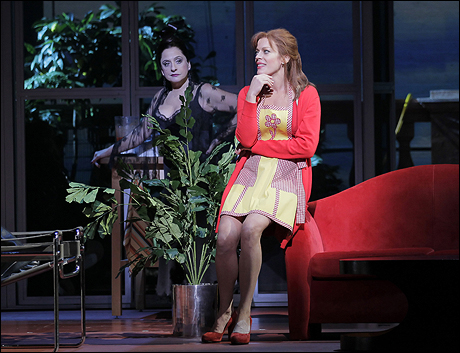
Patti Lupone and Sherie Rene Scott in the Original Broadway Production of Women on the Verge of a Nervous Breakdown (Photo © Paul Kolnik)
So what a shame that the show - despite a cast that had received nineteen Tony nominations (resulting in four wins) - didn't succeed. At least Patti LuPone (Lucia) and Laura Benanti (Candela) received Tony nominations.
Many would have thought that Sher would want to put Women way behind him. Wonder of wonders, miracle of miracles, he didn't. This past winter in London, he decided to try again - but he wouldn't just replicate what Broadway had seen at the Belasco as a way of insisting he was right all along and everyone else was stupid. Give him credit for completely rethinking the show to the point that anyone would be hard-pressed to believe it was a production by the same director.
First, Sher approved Anthony Ward's totally different set design. It was an all-white, duplex apartment with a railing on the second level that would have been right for the ocean liner on which Anything Goes takes place. Frankly, I wouldn't be at all surprised to learn that the set had been bought from a stock production of that '30s hit. For those who think I'm exaggerating, may I add that the front door of the apartment - yes, the front door, the one that opens right into the apartment itself - had a porthole in it. Who has a privacy-denying porthole on a front door?
Because it was a unit set, Sher would not repeat his mistake of confusing us where the many different scenes took place. Instead, he ensured that we knew where we were every step of the way by rolling on a blackboard that first proclaimed "Madrid, 1987" and continued to inform us of time and place. Very close to stage's edge, too, were the little set pieces that suggested bigger locales. A window frame rolled on, a telephone booth flew in. To represent a new location, characters quickly changed their clothes.
Another wise decision was booking The Playhouse, one of London's most intimate theaters. It has about 4/5ths of the seating capacity of the Belasco, but its stage isn't even half as wide. That lack of space helped make matters all the more chaotic, for Sher had his characters running around with the fervor of mice in a Skinner Box.
Frank Loesser was famous for saying that his The Most Happy Fella, for which he composed more than three dozen songs - many of which are operatic in nature - is not an opera but "a musical with a lotta music." Women is a musical comedy with a lotta comedy. We always hear how Sondheim's songs in A Funny Thing Happened on the Way to the Forum function as respites and time-outs from the frenetically farcical book. Precious few of the songs even come close to that famous musical theater goal of advancing the plot.
Sher proceeded as if he'd realized that the songs in Women could serve the same purpose. This allowed us to catch our collective breath from laughing so hard and enjoying Yazbek's witty score.
During the book scenes, in the time-honored tradition of farcical comedy, Sher placed his performers right at the lip of the stage while Peter Mumford's white-bright lighting engulfed them. When the time came for a song, for both variety and contrast, Mumford flooded the entire stage with vibrant colors from an intense lavender to a fabulous fuchsia.

Tamsin Greig and the cast of Women on the Verge of a Nervous Breakdown at the Playhouse Theatre in London. (Photo ©Tristam Kenton for The Guardian)
So Sher realized that the way to succeed was to direct the book of the show as if he were staging a British farce along the lines of Boeing-Boeing or Let's Get Laid. (Don't know that one? It concerned two detectives who were chasing a criminal named Gordon Laid; it ran nearly two years.)
As a result, this new take on Women can just as easily be called YES, SEX, PLEASE, WE'RE SPANISH, for every ingredient found in a '60s sex comedy is here, right down to the once-vital issue of virginity-loss. There are gags (Carlos: "Do you have a lawyer?" Candela: "I did, but he went back to his wife."), some of which take a stab at social commentary. (Lucia: "My father was a lawyer, but my mother was nice.")
Deprived of all its Broadway clutter, Women in London revealed itself as a terrific night of fun. It's an ideal show for a theater company that has fine singing actresses. Pepa has four songs, but Lucia gets two and Candela one - but what a one it is. "Model Behavior" shows us anything but, as Candela, in agony over her boyfriend and life, makes one phone call after another to Pepa, who isn't home - thus filling up the answering machine with messages. No wonder that Benanti was not only nominated but won a Drama Desk Award.
Your Ivan need not be a drop-dead handsome lady-killer but simply a man who has great confidence that he has plenty to offer. But you do need a solid comic for the character named Taxi Driver who, happily enough, bears no relation to Robert De Niro's Travis Bickle. Although Ricardo Afonso looked as scruffy as Che Guevara, he was far more genial.
This modest production did, however, result in Taxi Driver's being less accommodating. For in both the original film and Sher's Broadway production, Taxi Driver had a veritable drug store stocked in his cab. If you needed mints, cologne, aspirin or probably even corn plasters, Taxi Driver could oblige for a fee. On Broadway, Danny Burstein drove a veritable cab, but here Sher eschewed the mock apothecary and simply used two chairs to represent the taxi. You could get away with the same simple solution.
So if you've had success with sex farces at your theater and have been hankering to do a musical, consider Women on the Verge. Follow Sher's second template and have the right cast, and you'll get through without a nervous breakdown.
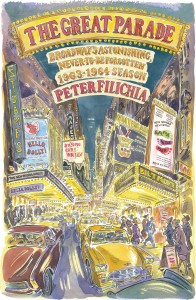
You may e-mail Peter at pfilichia@aol.com. Check out his weekly column each Monday at www.broadwayselect.com, Tuesday at www.masterworksbroadway.com and Friday atwww.kritzerland.com. His bookThe Great Parade: Broadway's Astonishing, Never-To-Be Forgotten 1963-1964 Season is now available at www.amazon.com.
Share
Callboard
-
Shake and shimmy it with the #Hairspray20Challenge! Join MTI and Broadway Media in celebrating 20 years of #Hairspray. Duet this here or find us on TikTok! Special thanks to @broadwaymedia and @jammyprod. Choreography Guides are a licensor official resource that provides step-by-step instruction from Broadway and professional choreographers for your productions! Visit @broadwaymedia to learn more. #mtishows #youcantstopthebeat #hairspraymusical #goodmorningbaltimore
View on Instagram









